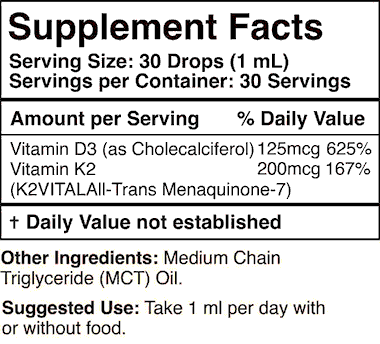
Vitamin D3 & Vitamin K2 – The Number One Health Habit for Most People
What Is Our Liquid Vitamin D3 and Vitamin K2 Supplement and Why It’s Powerful:
Vitamin D3 + K2 help your body stay strong by guiding calcium into bones—not arteries. Healthy bones, strong hearts, clear minds— all from two simple vitamins that do more than you’d expect.
Doublewood Vitamin D3 + K2 is a highly assimable combination of two essential nutrients that work together to help maintain healthy bones, balanced calcium levels, and overall well-being. It features the most bioavailable forms — D3 (cholecalciferol) and K2 as MK-7 — dispersed in a MCT carrier oil for the most efficient and maximum absorption possible.
Vitamin D3 and Vitamin K2 help the body make better use of the all-important mineral calcium by supporting its use in bones and teeth, rather than soft tissues. This makes the formula a smart choice for individuals focused on maintaining mineral balance and avoiding tissue calcification (hardening and stiffening of tissues).
⚠️ For most people, taking Vitamin D3 and Vitamin K2 together is among the most important and impactful supplement habits — but whether it is the most important depends on individual context (like diet, sun exposure, and existing health conditions).
Ingredient Sources of our Vitamin D3/K2 Liquid Supplement
Vitamin D3 (Cholecalciferol)
It is sourced from lanolin (sheep wool), widely regarded as the gold-standard, most assimilable and bioavailable source for vitamin D3.
Vitamin K2 (All‑Trans MK‑7, branded K2Vital®)
Features 99.9% all‑trans menaquinone-7, a long-lasting and highly absorbable form of K2 sourced from fermented natto—a traditional Japanese superfood. The all‑trans variant provides superior stability and biological activity compared to generic K2 forms.
Formula Base & Manufacturing
It is delivered in a clean MCT carrier oil (from coconut) for enhanced absorption and made in a cGMP-certified facility in the USA, with third-party testing and Certificates of Analysis for purity and potency.
Why You Should Take Our Liquid Vitamin D3 and Vitamin K2
Some people shop for supplements based on flashy labels or bold claims. At Healthy-Living, we focus on what matters most: well-informed choices and real-life benefits. Among the many options out there, Vitamin D3 and K2 stand out for how they support key areas of health—including bones, heart, and immune function. Their complementary roles are scientifically recognized, yet often overlooked. We believe they form a smart foundation for daily wellness.
Vitamin D3 helps your body absorb calcium. But without enough K2, that calcium might settle in the wrong places — like your arteries or soft tissues. Vitamin K2 acts like a traffic director, guiding calcium into your bones and teeth, where it belongs.
Together, these two nutrients support the systems that help you stay strong, sharp, and balanced. Benefits include:
- Strong, healthy bones and teeth
- Balanced and responsive immune function
- Smart calcium metabolism — less buildup in arteries
- Support for calm energy and clear thinking
Our liquid formula delivers fast, effective absorption — no capsules, no fillers, just pure high-potency D3 (cholecalciferol) and K2 (MK-7) in bioavailable forms your body knows how to use.
For many people, this is more than a supplement — it's a daily commitment to strength, resilience, and wise self-care in a world that often depletes us.
These statements have not been evaluated by the Food and Drug Administration. This product is not intended to diagnose, treat, cure, or prevent any disease.
Why Vitamin D3 Is One of the Most Valuable Nutrients You Can Take
Vitamin D3 plays a central role in human biology — influencing hundreds of biochemical pathways that help the body stay in balance, adapt to stress, and function at its best.
Nutritional science suggests that maintaining healthy vitamin D levels can support:
- Robust immune system function
- Healthy cell signaling and tissue resilience
- Calcium and phosphorus balance for bones, muscles, and teeth
- Respiratory system health and seasonal adaptability
- Muscle strength and physical endurance as we age
- Optimal aging and metabolic efficiency
- Conversion of key thyroid hormones into their active form
One of the most remarkable things about vitamin D3 is that your body can make it — naturally — when skin is exposed to sunlight. This evolutionary feature allowed humans to produce vitamin D even during times of scarcity. But in today's modern world, where we spend more time indoors and wear protective clothing or sunscreen, many people don’t get enough from sunlight alone.
Research shows that individuals living in sunny climates often maintain more stable vitamin D levels, which may contribute to a greater sense of vitality and resilience. Sunlight on skin is one of the body’s most effective ways of generating this nutrient — but for those who can’t get regular sun exposure, daily D3 supplementation becomes a smart, proactive step.
It’s also helpful to know that vitamin D requirements vary. People with higher body fat percentages may need more, as fat tissues tend to store vitamin D and reduce its availability in circulation. Likewise, those with deeper skin pigmentation often require more sun exposure to produce the same amount of D3.
While individual needs differ, many integrative health professionals suggest aiming for a serum vitamin D level between 60 and 90 ng/ml for optimal function. This often translates to a daily intake in the range of 4,000 IU to 7,000 IU, depending on body size, sunlight exposure, and personal health factors.
Always consult your healthcare provider before beginning any new supplement regimen. These statements have not been evaluated by the Food and Drug Administration. This product is not intended to diagnose, treat, cure, or prevent any disease.
Why Vitamin K2 Is Practically a Must for Long-Term Health
Vitamin K2 is one of the most overlooked yet essential nutrients for maintaining long-term health. While Vitamin K1 supports normal blood clotting, Vitamin K2 plays a more specialized role — directing calcium to where your body needs it and away from where it doesn’t.
In particular, K2 activates proteins that help bind calcium to bone tissue while keeping it from accumulating in soft tissues — such as arteries and joints — where it could contribute to long-term challenges. It acts as a biological guide, helping the body manage minerals with precision.
Emerging research suggests that healthy levels of Vitamin K2 can support:
- Strong, well-mineralized bones over time
- Calcium balance in the cardiovascular system
- Joint comfort and structural mobility
- Healthy aging and metabolic efficiency
The challenge? Most modern diets provide very little K2. It’s found primarily in aged cheeses, grass-fed animal fats, and a fermented soy food called natto — items many people rarely eat. As a result, Vitamin K2 insufficiency is surprisingly common.
For those who take calcium or Vitamin D3, K2 becomes even more important. Without enough K2 to activate the proteins that direct calcium properly, you may not get the full benefit — and in some cases, might inadvertently store calcium in the wrong places.
That’s why many functional health practitioners now consider Vitamin K2 — especially in its long-acting MK-7 form — to be an essential part of any long-term nutritional strategy.
These statements have not been evaluated by the Food and Drug Administration. This product is not intended to diagnose, treat, cure, or prevent any disease.
The Many Noticeable Ways Vitamin D3 & Vitamin K2 ® Help
Vitamin D3 & K2 Support Immune System Strength and Balance

- Vitamin D3 helps regulate immune cell activity and supports a healthy response to seasonal challenges.
- Vitamin K2 works synergistically with D3 to help manage inflammation and support the body’s natural defenses.
- Together, D3 and K2 assist in maintaining proper immune surveillance—critical for well-being during times of stress or exposure.
Vitamin D3 is well-documented for its role in modulating the innate and adaptive immune systems. It supports healthy white blood cell function and promotes the production of antimicrobial peptides. When paired with K2, these effects are more targeted and beneficial, helping the body maintain balance without unnecessary inflammation.

Supports a Healthy Pregnancy for Both Mother and Baby
Pregnancy increases nutrient requirements, and Vitamin D3 and K2 are especially important during this time. Vitamin D3 supports proper immune function, calcium absorption, and fetal bone development. K2 ensures that calcium is properly directed into developing bones rather than soft tissues.
Maintaining optimal D3 and K2 levels during pregnancy may support maternal bone health, reduce pregnancy-related swelling, and contribute to proper cardiovascular development in the fetus. Always consult a healthcare professional before taking supplements during pregnancy.

Vitamin D3 and K2 Support Healthy Skin and Hair
These vitamins contribute to the structural and functional health of the skin:
- Vitamin D3 receptors are found in skin cells and play a role in skin cell regeneration and repair.
- Low Vitamin D levels are often associated with dry, flaky skin and reduced skin elasticity.
- Vitamin K2 may help reduce the appearance of skin redness by supporting proper calcium placement in skin tissues and avoiding calcification of soft tissue.
- Balanced D3 and K2 levels may also support scalp health and hair follicle vitality through improved circulation and mineral transport.

Helps the Body Age More Gracefully
- Vitamin D3 helps preserve muscle strength and immune resilience—two critical factors in aging well.
- Vitamin K2 supports arterial flexibility by preventing calcium buildup in arteries, which becomes more common with age.
- Together, they help the body maintain strong bones, stable energy, and sharper cognition—areas commonly affected by the aging process.

Supports Heart and Artery Health
Vitamin D3 and K2 play complementary roles in maintaining a healthy cardiovascular system. D3 helps regulate calcium absorption, while K2 ensures calcium is deposited in bones—not in arteries. This dynamic may support arterial flexibility and reduce calcification risk over time.
Vitamin K2 in particular has been studied for its potential to lower arterial stiffness and support vascular integrity. When paired with D3, this combination supports overall heart health and circulatory resilience—especially in aging populations.
Vitamin D3 & Vitamin K2


How to Use Vitamin D3 & Vitamin K2®
Take 1 ml (20 drops) per day with or without food.
Videos about Vitamin D3 & Vitamin K2®ation
We disclaim any claims (if there are any) made in these videos. They are for information, education, enlightenment and entertainment only.


